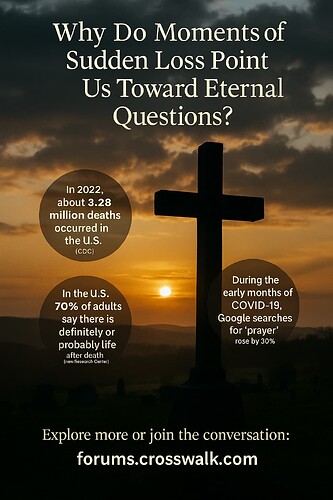Why Do Moments of Sudden Loss Point Us Toward Eternal Questions?
As Christians reflect on how tragedy sharpens our awareness of eternity, we invite your voice in Crosswalk Forums.
#HopeInChrist #EternalPerspective #christianforums #crosswalkforums #forums #crosswalk #faithcommunity #faithforums
When tragedy strikes—whether through natural disasters, sudden accidents, or untimely deaths—it confronts us with how fragile life really is. One moment, life seems steady and secure. The next, everything is overturned, leaving us with questions too deep to ignore. Loss interrupts our routines, challenges our assumptions, and forces us to face realities we often try to push aside.
For many, these moments awaken thoughts of eternity. Even those who rarely consider God may suddenly wonder: What happens after this life? Is there hope beyond the grave? For Christians, tragedies can stir both grief and reassurance. We mourn, but we also hold to the promises of resurrection and eternal life in Christ. Still, the emotions of loss press us to ask if our lives—and our faith—are truly grounded in what lasts forever.
The Apostle Paul described believers as “the pleasing aroma of Christ… to the one an aroma that brings death; to the other, an aroma that brings life” (2 Corinthians 2:15–16). In moments of loss, these contrasts feel especially sharp: life or death, hope or despair, Christ or nothing. Witnessing tragedy forces us to grapple with these eternal realities, even when we might rather avoid them.
So how should we think about the role of tragedy in shaping our awareness of eternity? Do sudden losses serve as reminders to live ready for what comes after this life? Or do they risk hardening hearts with fear or doubt instead of drawing them toward hope?
“Even if we don’t know those who are leaving this earth, their passing lives remind us that we need to be ready for it.”
Read the devotional here:

